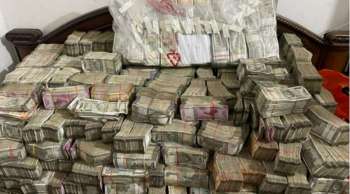The Enforcement Directorate has recently made headlines for a string of raids on businessmen, politicians, and bureaucrats. On Saturday, the federal agency seized Rs 17 crore from a businessman in Kolkata for Mobile Gaming Application fraud.The ED recently raided the home of former Bengal minister Partha Chatterjee’s aide Arpita Mukherjee, seizing nearly Rs 27 crore in cash and gold. Earlier in May, it seized approximately Rs 20 crore in cash in raids conducted at various locations, including the home of IAS officer Pooja Singhal, in connection with the Jharkhand MGNREGA funds fraud case and mining scam.From 2014 to 2022, the ED conducted 3,010 raids, a nearly 27-fold increase from 112 searches between 2004 and 2014.The ED has custody of assets worth over Rs 1 lakh crore as of 31 March 2022, which are linked to cases under investigation by the agency. Over Rs 57,000 crore of these are related to bank fraud and ponzi scheme cases.According to the ED website, which was accessed on September 11, 2005, 5,422 cases were registered under the PMLA in 17 years. However, only 25 people were found guilty, resulting in a very low conviction rate.What happens with the seized money?Most of the time, ED officials are seen carrying large stacks of money in large containers or arranging the money to spell the leader’s ‘E’ and ‘D’ before a press conference. But what happens to the massive amounts of cash left over after the raids?When a raid is carried out and cash is seized by the ED, it is kept at the agency’s office. Central investigation agencies, such as the ED, CBI, or the Income Tax Department, have the authority to conduct raids and investigations to seize movable and immovable property in cases of money laundering, scams, tax fraud, or irregularities.Following the seizure, the assets are calculated and a report, known as a ‘Panchnama,’ is filed detailing the seized cash and properties. The funds are then transferred to the ED’s bank account at public sector banks such as the Reserve Bank of India or the State Bank of India. If the cash, jewelry, or other valuables have any marks, indications, or evidence, they are kept in a sealed envelope and presented as evidence in court.When the accused are found guilty in court, the ED transfers the money to the government under Section-9 of the PMLA, which then spends it.In the event of a bank fraud?When money is taken in the form of loans by defaulters, it is also transferred to the banks from which the money was borrowed.The Enforcement Directorate recently transferred attached assets worth over Rs 8,441 crore to Public Sector Banks that suffered losses as a result of the bank fraud committed by fugitives Vijay Mallya, Nirav Modi, and Mehul Choksi in a massive move pertaining to the bank fraud case.As of now, approximately RS 23,000 crore has been refunded to Public Sector Banks through the sale of properties belonging to the accused whose assets were attached by the ED.Legal RestrictionsIf the Enforcement Directorate seizes property or cash under the PMLA Act, the property can be impounded for up to 180 days. During this six-month period, the ED must demonstrate that the property seizure was legal.If the property is not confirmed, it will be automatically released from ED’s attachment. Within 45 days, the accused may file an appeal with the Appellate Tribunal.In the case of properties attached by the agency, the accused may use the property until the case is resolved. However, the property remains out of bounds for the accused during the attachment period until the trial is completed.What if ED does not return?The Ed had seized Rs 7.95 lakh from Manak Kala, the owner of a travel agency, in 1995 for alleged violation of foreign exchange law. In 2014, the ED fined him Rs 75 lakh and ordered the confiscation of Rs 7.95 lakh.He appealed the order first to the Special Director (Appeals), who reduced the penalty, and then to the Appellate Tribunal for Foreign Exchange, which dismissed his appeal. He later petitioned the Supreme Court. The high court ruled that the confiscation of Rs 7.95 lakh from Kala’s office was unjustified and upheld his appeal while overturning the tribunal’s decision.The Delhi High Court ordered the ED to return the Rs 7.95 lakh seized from Kala “illegally” in 2020. The court ordered the ED to return the seized funds, plus six percent interest per year from the date of seizure, in 1995, until the date of payment.














